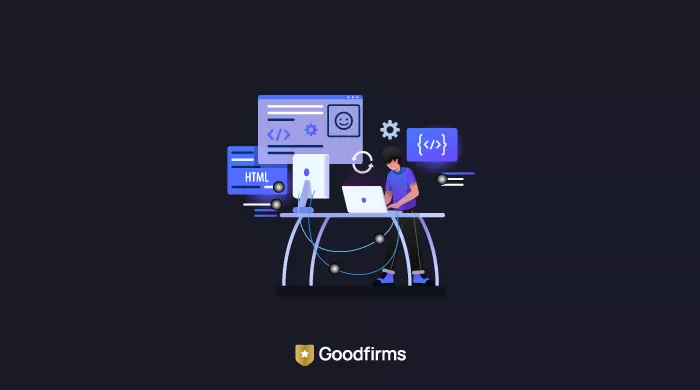Software design and development play a pivotal role in revolutionising industries like motorsport and gaming, creating innovative solutions that captivate users. Leveraging cutting-edge technologies like AI, VR, mixed reality, and more enables developers to craft mesmerizing experiences that help enhance engagement and performance. In gaming, this simulation carries players to immersive virtual worlds. Moreover, in motorsport, these technologies offer extra perks by allowing simulation of real-world scenarios that aid in training and strategy refinement. Leveraging expert software development and design services specializing in UX, businesses can build tailored solutions for motorsport that merge creativity with functionality. This synergy of software design, development, and emerging technologies like AI, VR, and mixed reality is reshaping how motorsport users interact with digital platforms, attracting more users, and offering limitless opportunities and potential for innovation for businesses.
Goodfirms Roundtable is a series of podcast interview discussions where leading industry experts, CEOs, and people holding prominent positions in IT services and software companies share their valuable experiences and opinions on various topics. The podcast discussion becomes a rich source of information for budding entrepreneurs willing to start their businesses.
Goodfirms recently had a chance to interview Nicola Cogotti, CTO & Digital Transformation Architect, Alpha Cogs. In the following podcast discussion, Nicola shares his knowledge and views about how and why modern businesses must embrace the combination of AI, VR, and Mixed Reality in Motorsport.
Alpha Cogs is a UK based software development company that specializes in broad-spectrum digital services, including software design, website development, mobile app development, team augmentation, UI/UX, video games, cloud architecture, business intelligence & analytics, big data processing, and many more solutions. Alpha Cogs is the perfect design and development partner for companies who are passionate about sustainable and fair trade practices in all areas of their business. The company caters to businesses spanning across varied industries worldwide. AlphaCogs leaves no stone unturned to fulfil the requirements of its clients and eliminate their limitations. With a customer-centric service approach, the company builds innovative software solutions that help their clients elevate their businesses to the next level.
The Podcast Discussion Highlights the Following:
- How AI, VR, and mixed reality are currently shaping the motorsport industry?
- How AI, VR, and mixed reality have progressed in motorsports in the past few years, specifically?
- Insights on the key players driving innovations in AI, VR, and mixed reality within motorsports.
- Some examples of exciting breakthroughs happening in motorsport with some recent innovations that stand out.
- How VR is being used in live races to enhance fan engagement?
- How can AI be used to analyze driver performance and optimize racing strategies in motorsport?
The Podcast Also Covers These Crucial Points:
- Some tools and software that teams use today to gain a competitive edge with AI in motorsport.
- Some emerging trends and technologies that would further transform motorsports in years to come.
- What will be the future of AI, VR, and mixed reality over the next 5 to 10 years within motorsports?
Today’s focus is on the role of AI, VR, and mixed reality in motorsport. Can you start by sharing how these technologies are currently shaping the motorsport industry?
Initiating the discussion, Nicola elaborates that artificial intelligence (AI) has been a part of the IT space for a long time, starting in 1956 at Dartmouth College in the USA. However, over the years, the hardware is getting robust enough to support AI, ML (machine learning), and generative AI and to make these technologies accessible to the masses. Similarly, according to Nicola, the concept of virtual reality (VR), or the dream of creating immersive parallel universes, is as old as video gaming itself.
Nicola specifies that today the world has the right hardware, technology, and computing power needed to build truly immersive virtual and mixed reality experiences that can reshape numerous industries. Particularly in motorsport, like Formula One, Formula E, and MotoGP, ML and AI are creating wonders, enabling competitive advantages to businesses embracing the same.
In motorsport, AI, VR, and mixed reality help develop car models with high precision, speed up the innovation process, shrink costs, and enhance safety for drivers and all the relevant stakeholders. These technologies enable the teams and drivers to test the vehicle virtually long before it is physically made. Nicola highlights that Shell, the energy company, also uses ML and AI to develop new fuel versions that aim to improve the performance of current internal combustion engines while reducing their carbon footprint, and Pirelli uses ML to enhance tire construction in Formula One, allowing Formula One to race in colder temperatures and winter months.
Nicola further reveals that at Alpha Cogs, they leverage AI and VR to create an advanced platform that can connect everyone in motorsport in unprecedented ways, help democratize motorsport, and provide everyone the opportunity to experience it to its fullest. Nicola adds that these technologies are thus making a significant impact not only within motorsport but also across all operations surrounding the sport.
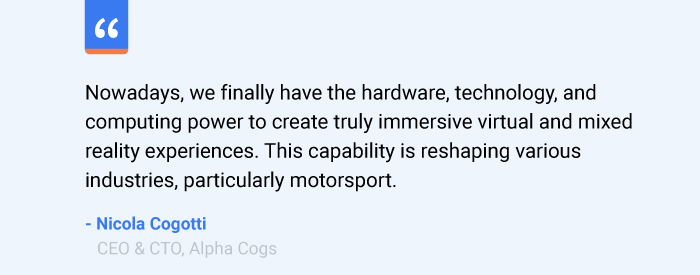
These Technologies Have Evolved Rapidly Over the Years. How Have You Seen AI, VR, and Mixed Reality Progress in Motorsports in the Past Few Years, Specifically?
Nicola explains that AI and VR have progressed rapidly in motorsports. Moreover, recently motorsport partnerships are shifting their focus on technology. Formula 1 teams that partnered with tobacco companies like Marlboro and Camel in the 90s, by the 2000s, they began collaborating with banking sectors, like Ferrari's partnership with Santander. However, today, motorsport teams like Ferrari are collaborating with IT giants like HP and Red Bull with Oracle. Google is also a main partner in Formula E. According to Nicola, these alliances allow these teams to leverage cutting-edge technologies; for example, the virtual twin technology has given teams a significant edge in competition, allowing them to improve performance, cut costs, reduce environmental impact, and streamline daily operations. Further, it enables the visualization and fine-tuning of the car and driver setup. Thus, the team that can achieve the most accurate virtual twin of their car, can perform the best in the championship.
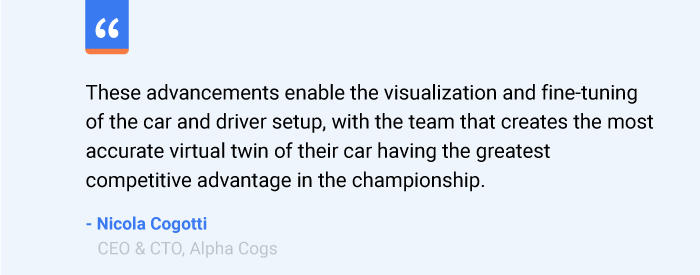
Motorsport Brands Can Indeed Build Strong Connections With Their Audience in This Era With AI and VR, Enhancing Engagement and Loyalty While Also Optimizing Sponsorship Opportunities in Today’s Highly Competitive Motorsport Market. Moving to Our Next Segment, Every Industry Has Its Trailblazers. Who Do You See as the Key Players Driving Innovations in AI, VR, and Mixed Reality Within Motorsports?
Nicola mentions that Formula E, Formula 1, and MotoGP constitute the biggest players driving innovation in motorsport. These brands are making substantial investments in technology and creating the most significant breakthroughs in motorsport. Nicola highlights that he got the opportunity to speak with key figures from Formula E and came to learn that Jaguar TCS Racing in Formula E is especially pioneering virtual twin technology that helps them sometimes reach higher levels of accuracy than those in Formula 1. Moreover, Jaguar is exploring advanced materials, like liquid metal, which offers better energy storage, occupies less space, generates less heat, and therefore enhances safety and efficiency for EV batteries. This is benefitting not just motorsport, but the society too by reducing issues like EV fires and improving charging times, creating lighter, safer, and faster-charging batteries.

With These Innovators Constantly Pushing the Envelope, There Must Be Some Exciting Breakthroughs Happening. What Are Some Recent Innovations in Motorsport That Stand Out to You?
Nicola believes that the digital twin technology, which is a combination of AI, VR, and mixed reality, is the biggest innovation impacting motorsport. Digital twin is a virtual replica of the real car. Along with computational fluid dynamics (CFD), the technology enables developers to build highly realistic models of a car that allow teams to design and evaluate the car’s performance without physically constructing it and helps reduce costs and materials. Further, it allows drivers to test the cars beforehand, preventing the production of a failed product at the initial stage itself. Digital twin technology thus enables businesses to conserve physical resources and perform extensive virtual testing, enhancing both speed and accuracy in innovation for the motorsport industry.
Nicola further explains that due to some recent regulatory changes in Formula One, ground-effect cars are being introduced. Ground effect is a physical phenomenon that helps cars generate significant grip to be able to stick to the ground through pressure against the track, created by air passing under the car. However, when a car goes too fast and gets too close to the ground, the grip from the ground effect disappears, causing a bouncing effect. Nicola reveals that Red Bull did not face this issue as they developed a highly accurate virtual twin of their car that allowed them to address the problem before track testing, while Ferrari relied more on traditional tools, facing performance loss and significant costs.
Additionally, Nicola highlights that Formula E and Formula One cars have around 200 sensors capturing data at a rate of 1.1 million data points per second. Development teams can create highly advanced virtual twins by analyzing this data through machine learning and creating models with virtual reality and CFD (computational fluid dynamics).
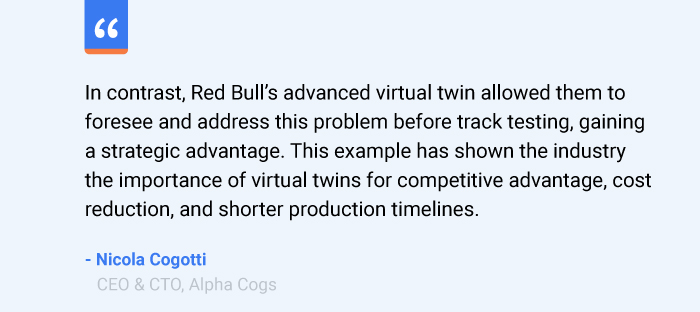
Moving on to Enhancing Fan Experience, One Exciting Aspect Is the Immersive Experience That Technology Can Offer. We’ve Touched On VR, Which Transforms How Fans Engage With Races. Can You Tell Us More About How VR Is Being Used During Live Races to Enhance Fan Engagement?
VR is one of the best technologies for enhancing fan engagement by allowing them to experience motorsport and actively immerse themselves into it without being physically present. Nicola discloses that with a goal to make this experience accessible to everyone in an affordable manner, Alpha Cogs has developed a VR live-streaming solution that offers fans the chance to experience motorsport events almost as if they were on location.
Nicola elaborates that VR streams, to be able to recreate a 360-degree environment, require a higher volume of data than standard video streams like those on Netflix or Prime Video; thus, in the absence of a smooth streaming, users can possibly experience motion sickness. The company is thus optimizing their VR platform to reduce latency, to eliminate these issues and ensure a smoother VR experience.
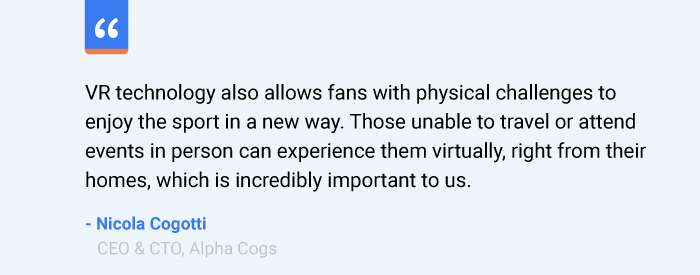
Now, Moving On, Let’s Talk About Performance and Safety. In Racing, They Are Everything, Right? How Is AI Being Used to Analyze Driver Performance and Optimize Racing Strategies?
Nicola clarifies that in racing, a vast amount of data is available from past accidents and catastrophic events, which can help predict and prevent incidents to enhance safety when analyzed with ML. In Motorsports, the ideal approach to tackle dangers is proactive action, taking predictive measures to stop catastrophic events before they happen. Another approach commonly used is post-incident action, focusing on responding to an event in a manner that can minimize harm; for example, in 1994 in Formula 1, following the fatal crashes of Roland Ratzenberger and Ayrton Senna at Imola, Max Mosley led a significant safety campaign. They added new equipment like the head and neck support system (HANS), wheel tethers, and the Halo device to protect drivers.
However, Nicola emphasizes that today advanced ML, AI, and virtual reality have made it possible to predict these issues before they happen; for example, Sebastian Vettel had a crash at the German Grand Prix. The intensive VR and simulation training these drivers get, helped him exit the car using a specific technique to avoid electric shock when his car’s hybrid engine posed a risk in the rain.

The Impact of VR on Motorsports Is Mind-Blowing. It’s Amazing How Technology Is Reshaping the Motorsport Experience, Not Only for Drivers but Also for Fans. Speaking of AI, Are There Any Tools or Software That Teams Use Today to Gain a Competitive Edge?
Nicola elaborates that virtualization of cars is not the only way teams use AI and machine learning. These technologies leverage data, collected through hundreds of sensors installed in modern race cars, to understand the car’s real-time condition and compare on-track results with digital twin simulations.
Moreover, Nicola adds that AI is often used in the production process in the car’s engineering phase and also as a validation tool for the virtual twin for analyzing results to catch discrepancies between the simulation and the actual car on the track. Besides, it enables drivers to become familiar with tracks that they have never physically driven, boosting both performance and safety.
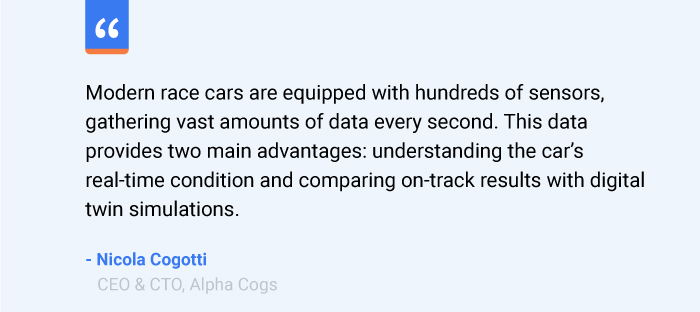
Now, Let’s Dive Into Our Next Segment About the Future Trends and Development. Now Looking To the Future, What Emerging Technologies Do You See on the Horizon That Would Further Transform Motorsports?
Nicola agrees that AI, ML, and virtual reality will remain dominant in motorsports in the future. Moreover, with advancing technology, not only software, but hardware too will undergo continuous innovation to be able to support these next-gen algorithms.
Besides, another significant future trend and big evolution in the IT sector will be the advent of quantum computing. It will allow multitasking and expand the capabilities of traditional computers through its two important characteristics, superposition and entanglement, which can be game-changers for AI and ML algorithms, making them ten to twenty times more powerful.

Alright, as a Leader in This Field, Where Do You See AI, VR, and Mixed Reality Heading Over the Next 5 to 10 Years Within Motorsports?
Nicola details that earlier software, being easier to develop, usually advanced faster than hardware that requires research, component assembly, and shipping. However, over the last three to four years, hardware is evolving almost as quickly as software. Nicola cites the example of NVIDIA, which has been traditionally a hardware-focused company that has grown at an unprecedented rate, surpassing giants like Apple, Microsoft, and AWS now.
Nicola believes that AI, ML, VR, and quantum computing will drive the IT market over the next five years, laying the foundation of future advancements in every sector, including education, sports, luxury, fashion, and more.
Nicola then highlights what Roberto Lombardi said at the APT Summit in Florence, “It is only when every part of a system moves towards the same goal that a disruptive revolution is possible.” Nicola explains that Lombardi was referring to the fashion industry here, where AI will help reduce CO2 emissions and environmental impact.
Nicola also quoted a notable remark from the AWS Executive Leaders Summit in London by Phil LeBrun, “Those who will not embrace AI will be designated to become irrelevant.”

You can listen to this podcast here.
What’s Next
Driven by advancements in technologies that help enhance the user experience, motorsport is evolving rapidly. Innovations in software development, AI, VR, and mixed reality are transforming how fans engage with races, from immersive simulations to real-time analytics.
Businesses in the motorsport industry are embracing these technologies to improve performance, attract audiences, and deliver personalized experiences. AI optimizes race strategies, while VR and mixed reality offer interactive experiences that bridge the gap between the physical and digital worlds. As these technologies continue to advance, they promise to redefine the future of motorsport, making it more accessible, engaging, and profitable for fans and businesses alike. Adopt these technologies now to create ingenious experiences and gain a competitive edge in motorsport.
You can share your knowledge or experience on our platform on any topic related to IT services. Just drop an email to [email protected].





